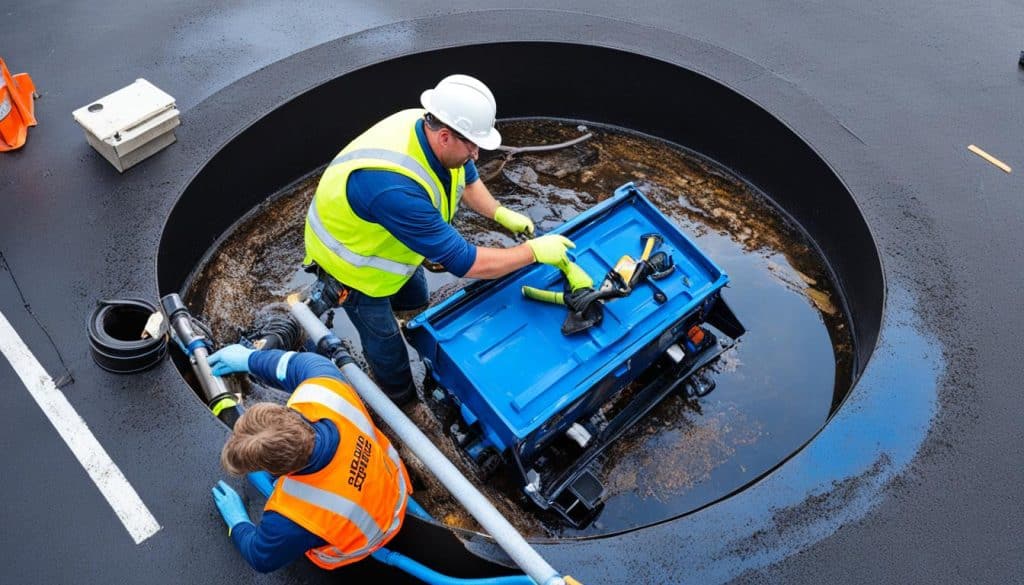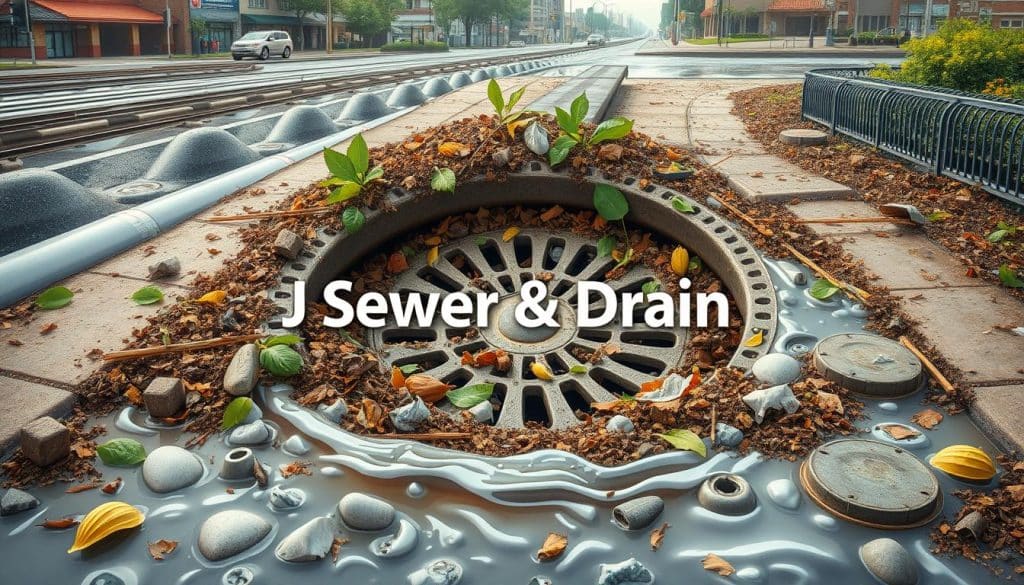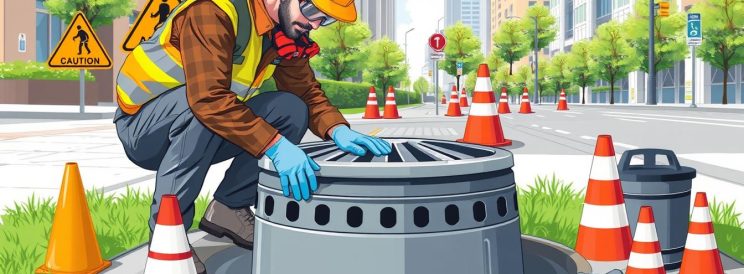Ever thought about What Precautions Should I Take When Cleaning a Catch Basin? Catch basins are key in managing urban stormwater. They trap pollutants and lower flood risks. It’s vital to follow safety rules while cleaning them to avoid harm to you and the environment.
This guide, based on J Sewer & Drain Plumbing Inc.‘s best practices in Chicago, covers important safety tips. We talk about how to handle the grate and keep traffic safe. These steps ensure a safe and effective cleaning process.
Key Takeaways:
- Understand the role of catch basins in urban stormwater management.
- Recognize the importance of regular maintenance to prevent flooding and pollution.
- Learn essential catch basin cleaning precautions for safety and efficiency.
- Discover effective techniques for handling the grate and implementing traffic safety.
- Avoid direct contact with pollutants to protect your health and the environment.
Understanding the Importance of Catch Basin Cleaning
Keeping catch basins in good shape is key for managing stormwater and protecting the environment. These basins are vital for catching stormwater runoff. They also trap sediments, debris, and pollutants.
Function and Design of Catch Basins
Catch basins have important parts like a grate, sedimental sump, and an outlet pipe tee. The grate lets water in but keeps big debris out. The sump catches smaller particles and pollutants, stopping them from getting into water systems.
The outlet pipe sends clean water to the drainage system. This keeps harmful materials from polluting natural waterways.
Why Regular Cleaning is Essential
Cleaning catch basins regularly is vital for their performance. Without upkeep, they can get clogged with debris. This can cause water to back up, leading to flooding and harming the environment.
It’s important to follow best practices for cleaning catch basins. This improves water quality and makes the basins last longer. Companies like J Sewer & Drain Plumbing Inc. offer a 5-year guarantee on parts and labor for underground sewer repairs. This shows how crucial it is to keep catch basins in good condition.
Preparing for Catch Basin Cleaning
Getting ready for catch basin cleaning is key. You need the right tools and safety gear. This makes the job easier and safer.
Gathering Necessary Tools and Equipment
You’ll need shovels, buckets, and vacuum trucks for cleaning. These tools help remove dirt and sediment well. Companies like J Sewer & Drain Plumbing Inc. say using good equipment is important.
Having the right tools shows the value of preventative steps for catch basin cleaning. It makes the job easier.
Safety Gear and Personal Protective Equipment
Wear gloves, protective eyewear, and sturdy shoes to stay safe. This is crucial for avoiding harm from catch basin materials. J Sewer & Drain Plumbing Inc. stresses the need for safety gear.
They offer a 1-year guarantee on parts and labor for plumbing jobs. This shows their dedication to safety.

Inspecting the Catch Basin Before Cleaning
Before you start cleaning, it’s key to inspect the catch basin. This step helps find and fix any problems early on. It’s a crucial part of keeping the catch basin in good shape.
Identifying Visible Blockages and Debris
Start by looking for blockages and debris. This is important because they can stop water from flowing right. Remove any leaves, trash, or other stuff that’s clogging the basin.
Checking for Structural Damage
After clearing out debris, check for any damage. Look for cracks or wear and tear. Fixing any damage is important to keep the system working well.
Assessing the Water Flow
Finally, check how water flows through the system. It’s important for the basin to handle stormwater well. Add water and see if it flows smoothly. Any problems could mean there’s an issue.
What Precautions Should I Take When Cleaning a Catch Basin?
When cleaning a catch basin, safety is key. Whether you’re a pro or a homeowner, following safety tips is crucial. It keeps you safe and ensures the job gets done right.
Handling the Grate with Care
Handling heavy grates safely is a big part of catch basin care. These grates can be hard to handle and might hurt you if not done right. Use the right tools and methods to lift them without straining or getting hurt.
Don’t try to lift a heavy grate by yourself. Always get help when it’s too much for one person.
Implementing Traffic Safety Measures
In busy places like Chicago, IL, keeping traffic safe is important. Catch basin maintenance often happens near roads. This means using signs to warn drivers.
Set up safety cones and barriers to keep workers and pedestrians safe. Never leave a catch basin open without someone watching to prevent accidents.
Avoiding Direct Contact with Pollutants
Staying safe from harmful substances is also crucial. Wear the right protective gear like gloves, masks, and goggles. This protects you from chemicals, bacteria, and other dangers.
J Sewer & Drain Plumbing Inc. stresses how important this is for anyone cleaning catch basins.

By following these safety steps, you make sure your catch basin maintenance is effective and safe for you.
Effective Cleaning Methods
To keep drainage systems working well, it’s important to clean catch basins properly. First, we remove big objects that block the basin. Then, for tough blockages, we use tools and high-pressure water jets.
Vacuum trucks are great for big jobs, especially in public areas. They suck up leaves, sediment, and more. J Sewer & Drain Plumbing Inc. uses different cleaning methods for each catch basin, making sure they work right.
Following strict cleaning practices keeps drainage systems running smoothly. It also helps follow local rules for disposing of waste. This way, we protect the environment and meet regulations.
Disposing of Debris Safely
It’s important to dispose of debris from catch basin cleaning safely. This keeps our environment clean and prevents harmful substances from getting into our water. J Sewer & Drain Plumbing Inc. focuses on eco-friendly catch basin maintenance. They make sure waste is disposed of according to local rules.
Every piece of waste from catch basin cleaning needs to be checked. This means figuring out if it’s solid or hazardous waste. Then, it’s sent to the right place, like a landfill or a treatment facility. Following these steps helps protect our environment and supports local ecosystems.
In cities like Chicago, following strict environmental rules is key. J Sewer & Drain Plumbing Inc. is a great example. They follow these rules and offer special deals to encourage people to take care of catch basins. This helps raise awareness and keeps our environment clean and safe for all.


